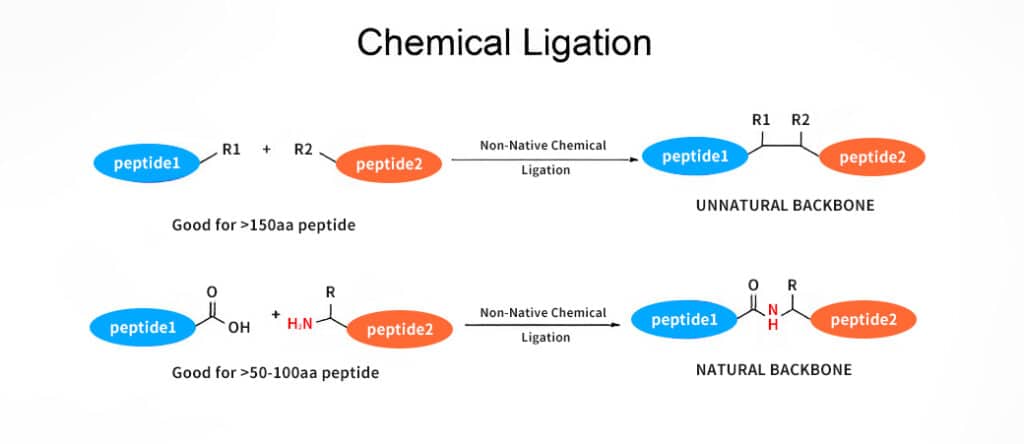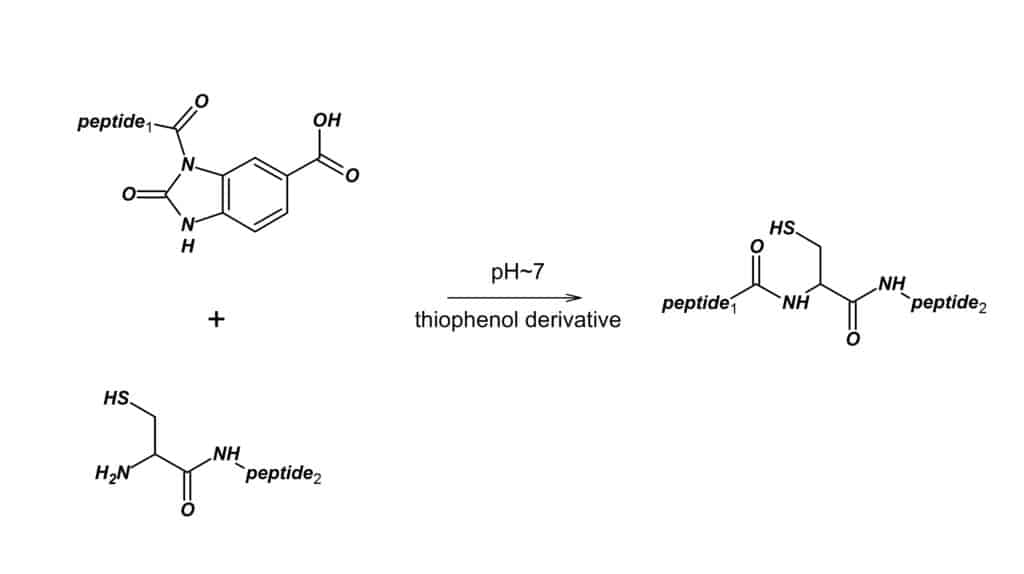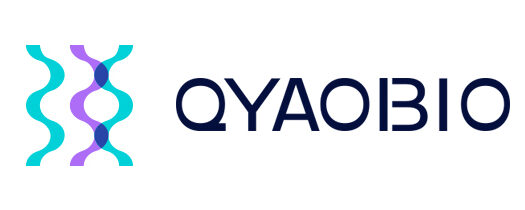Long Peptide Synthesis
Long peptide synthesis is critical in custom peptide synthesis.
Long peptides with amino acids sequence over 50 to 200 are required in different types of research. Therefore, long peptide synthesis is critical in our custom peptide synthesis. Long peptides are required in many studies and researches. In tradition, more than 50 amino acid sequences are referred to as proteins, while short sequences are polypeptides. However, the advanced technology drive the limitation of amino acid sequence in peptide chains, it is capable to synthesize longer amino acid sequences now. Therefore, long peptides have widely applications and make up shortcoming of proteins. The synthetic long peptide-binding adjuvants are applied widely in cancer therapeutic vaccine research.
Long Peptide Synthesis Methods
There are two main synthesis methods of long peptide: gradual growth and fragment condensation.
- Gradual growth: This method starts with the starting amino acid (or peptide), then grows one amino acid per connection.
- Fragment condensation: This technology condensates a C-terminal protective peptide and an N-terminal protective peptide. The new long peptide is the chain sum of the protective two peptides.

QYAOBIO has excellent experience in long peptide synthesis, we apply a variety of strategies to overcome the poor solvation and aggregation, the main method includes:
- Polar solvent mixtures (Magic Mixture, chaotropic salt additives)
- Increased temperatures and microwave irradiation
- Protected fragment condensation
- Native chemical ligation (unprotected fragment condensation)
- Low resin substitution and high-swelling resins
Strategies of Long Peptide Synthesis
The challenges of long peptide synthesis, including:
- Large cumulative effect in reaction yield
- Inefficiency of peptide aggregation (slow or incomplete coupling, protection reversing)
- Poor solvation or low solubility in assembly of protected peptides
Most proteinogenic-based peptides can be synthesized in the linear fashion by solid-phase peptide synthesis (SPPS). However, long peptides with sequences exceed 70 amino acids require alternative techniques to synthesize. As there are different factors to result in inefficient coupling and deprotection, such as poor solvation of protected peptides during synthesis, inter-molecular hydrogen bonds among fragments.
Chemical ligation technologies
Normally, the preparation of protected fragment is easy for short peptide, but longer fragments (more than 10 AAs) suffer the issue of poor solubility. Besides, the coupling of fragments without a C-terminal glycine residue, will create peptide diastereomers.
QYAOBIO applies fragment synthesis and chemical ligation technologies to make unprotected peptide chains react chemo-selectively in aqueous solution. The most common chemical ligation is the peptide thioester reacts with a terminal cysteine residue.

Chemo Enzymatic Peptide Synthesis (CEPS)
Chemo enzymatic peptide synthesis (CEPS) is the cutting-edge technology for synthesis of even longer peptides. This technology apply the unique versatile engineered enzyme for trace-less ligation of peptides. It is the simplest way to get long peptides in active conformation without recombination. CEPS is suitable for production of long peptides up to 150~200 amino acids in length, such as: chemokines, cytokines and nanobodies.
Long peptide synthesis efficiency
Based on the challenges in long peptide synthesis, our technique team develop three schemes to improve the synthesis efficiency.
- Microwave synthesis: This method is suitable for amino acids, which are hard to condensate in synthesis process. Microwave synthesis is a significant effect method, it can reduce the reaction time greatly.
- Fragment synthesis: Once it is difficult to synthesize certain peptides by conventional synthesis method. We will synthesize some amino acids as a fragments, then condensate to the peptide chain.
- Hydrazine synthesis: Hydrazine synthesis method applies selectively chemical reaction between N-terminal Cys peptide and C-terminal peptide acyl hydrazine to forming amide bond in the solid phase synthesis. According to Cys (Cysteine) position in peptides, we can divide the entire peptide chain into a variety of sequences to synthesize separately, then apply liquid phase condensation reaction to obtain the target peptide eventually. This method improves the final purity significantly, and applied widely in long peptides synthesis containing Cys.
Custom Long Peptide Service
QYAOBIO provides long-chain peptides with certain amino acid sequences according to customer’s requirements. Our high reliable synthesis service will ensure high purity and high success rate.
- Long-chain peptides synthesis by peptide synthesizers and microwave reactors.
- Routine analysis after synthesis
- MALDI-TOF Mass spectrometry for detection and identification
- Quality evaluation report
As one of the best producers of custom peptide synthesis in China, Qyaobio has developed a variety of proprietary technologies, peptide manufacturing facilities, and professional synthesis expertise. In order to ensure our capability of high quality and complex peptides in research grade.
Call Us
+86(021)-50795728
+86(027)-60707970
